|
|
 |
|
Calanoida ( Order ) |
|
|
|
Metridinidae ( Family ) |
|
|
|
Metridia ( Genus ) |
|
|
| |
Metridia ornata Brodsky, 1950 (F,M) | |
| | | | | | | Syn.: | Metridia sp. Giesbrecht, 1895 c (p.257) | | | | Ref.: | | | Brodsky, 1950 (1967) (p.303, figs.F,M); Vaupel-Klein, 1970 (Rem., p.36, 43: Tabl.III); Chihara & Murano, 1997 (p.837, tab.6); Markhaseva, 2001 (p.48, figs.F,M); Yamaguchi & al., 2002 (p.1007, tab.1); | 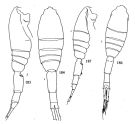 issued from : E.L. Markhaseva in Zoosystematica Rossica, 2001, 9 (1). [p.69, Figs.184-187]. Female: 184, habitus (dorsal view); 185, idem (idem (right lateral view); 186, idem (dorsal view); 187, idem (right lateral view); specimens of two stations. Nota : Cephalosome without collar on either side. Rostrum of 2 haired filaments at subdivided base. Genital somite nearly 2.1 times as long as wide (dorsal view), with elongate spermathecae both either dark or light. Caudal rami about 5-6 times as long as wide. A1 24-segmented exceeding by 2-3 distal segments the body length. Oral parts and Mxp as in M. ferrarii.
|
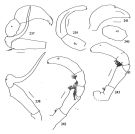 issued from : E.L. Markhaseva in Zoosystematica Rossica, 2001, 9 (1). [p.70, Figs.188-198]. Female: 188, urosome 4 and anal somite (dorsal view); 189-190, caudal rami (dorsal view); 191, caudal ramus (right lateral view); 192-193, cephalon in anterior view; 194-195, cephalosome (right lateral view); 196, genital somite (right lateral view); 197, idem (ventral view); 198, rostrum. From different specimens.
|
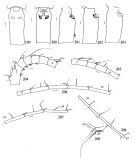 issued from : E.L. Markhaseva in Zoosystematica Rossica, 2001, 9 (1). [p.71, Figs.199-209]. Female: 199-200, genital somite (ventral view); 201-203, idem (right lateral view); 204, right A1 (segments 1-6); 205, idem (segments 7-10); 206, idem (segments11-15); 207, idem (segments 16-18); 208, idem (segments 19-22); 209, idem (segments 23-24). After specimens from different stations.
|
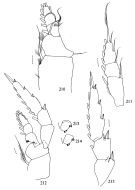 issued from : E.L. Markhaseva in Zoosystematica Rossica, 2001, 9 (1). [p.72, Figs.210-215]. Female: 210, first leg (coxopod, basipod and endopod); 211, idem (exopod); 212, second leg; 213, idem (right endopod); 214, idem (left endopod); 215, third leg. After specimens from different stations
|
 issued from : E.L. Markhaseva in Zoosystematica Rossica, 2001, 9 (1). [p.72, Figs.210-215]. Female: 210, first leg (coxopod, basipod and endopod); 211, idem (exopod); 212, second leg; 213, idem (right endopod); 214, idem (left endopod); 215, third leg. After specimens from different stations
|
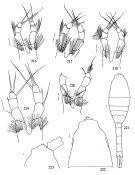 issued from : E.L. Markhaseva in Zoosystematica Rossica, 2001, 9 (1). [p.73, Figs.216-220]. Female: 216-220, fifth legs (from different specimens). Male: 221, habitus (dorsal view); 222, cephalosome; 223, cephalosome (anterior view).
|
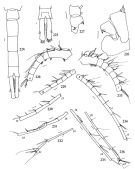 issued from : E.L. Markhaseva in Zoosystematica Rossica, 2001, 9 (1). [p.74, Figs.224-236]. Male: 224, urosome; 225, anal segment and caudal rami; 226, second leg (exopod.1 and endopod.1); 227, idem (endopod.1-2); 228, left A1 (segments 1-6); 229, idem (segments 7-12); 230, idem (segments 13-15); 231, idem (segments 16-18); 232, (segments 19-21); 233, right A1 (segments 1-7); 234, idem (segments 8-15); 235, idem (segments 16-19); 236, idem (segments 20-25). From different specimens. Nota : Prosome 1.1-1.2 times as long as urosome. Collar absent. Genital somite withou hairs at small projection on the right. Caudal rami about 4.8-6.6 times as long as wide. Left A1 geniculated, reaching the end of anal somite ; right A1 reaching the middle length of caudal rami.
|
 issued from : E.L. Markhaseva in Zoosystematica Rossica, 2001, 9 (1). [p.75, Figs.237-243]. Male: 237, left fifth leg; 238, idem (coxopod, basipod and exopod.1); 239, idem (exopod;2-3, other position); 240, idem (exopod.2, other position): 241, idem (exopod.3, other position); 242-243, right fifth leg (different positions).
|
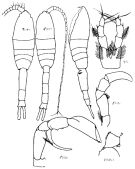 Issued from : K.A. Brodskii in Calanoida of the Far Eastern Seas and Polar Basin of the USSR. Opred. Fauna SSSR, 1950, 35 (Israel Program for Scientific Translations, Jerusalem, 1967) [p.304, Fig.210]. Female (NW Pacific: 35° N, 125° W): habitus (dorsal and lateral left side); S2En1, endopodal segment 1 of P2; S5, P5. Male: habitus (dorsal); S5Le, left P5; S5Ri, right P5.
| | | | | Compl. Ref.: | | | Harding, 1974 (p.141, tab. 3, gut contents); Ikeda & al., 2006 (p.1791, Table 2); Galbraith, 2009 (pers. comm.); Park & Ferrari, 2009 (p.143, Table 6, Appendix 1); Homma & al., 2011 (p.29, Table 2, 3, abundance, feeding pattern: suspension feeders) | | | | NZ: | 7 | | |
|
Distribution map of Metridia ornata by geographical zones
|
| | | | | | | Loc: | | | Bering Sea, S Aleutian Basin, off S Aleutian Is., Kamchatka, off E Japan, Station Knot, off British Columbia, off California, Antarct. (Pacif., Atlant., E Indian), Sub-Antarct. (Drake Passage), Sargasso Sea (off E Cape Cod) | | | | N: | 10 | | | | Lg.: | | | (22) F: 8,5-8; M: 9-8; {F: 8,00-8,50; M: 8,00-9,00} | | | | Rem.: | Bathypelagic.
This species seems bipolar.
In vertical tow 4000-3000 m (Harding, 1974). Its presence in the Sargasso Sea is surprising and explains only by the profound polar currents.
For Brodsky (1967, p.304) this species differs from the closely related M. princeps in the characteristic form of the head (notched) and in the structure of P5 of both sexes. The frequent confusion between M. princeps, M. macrura, M. ornata and M. ignota masks their individual distribution.
After Markhaseva (2001, p.49) this species apparently can be considerd as bipolar : its northernmost record is at 57°N in the Bering Sea and southernmost at 70°S. | | | Last update : 17/01/2015 | |
|
|
 Any use of this site for a publication will be mentioned with the following reference : Any use of this site for a publication will be mentioned with the following reference :
Razouls C., Desreumaux N., Kouwenberg J. and de Bovée F., 2005-2026. - Biodiversity of Marine Planktonic Copepods (morphology, geographical distribution and biological data). Sorbonne University, CNRS. Available at http://copepodes.obs-banyuls.fr/en [Accessed March 03, 2026] © copyright 2005-2026 Sorbonne University, CNRS
|
|
 |
 |










